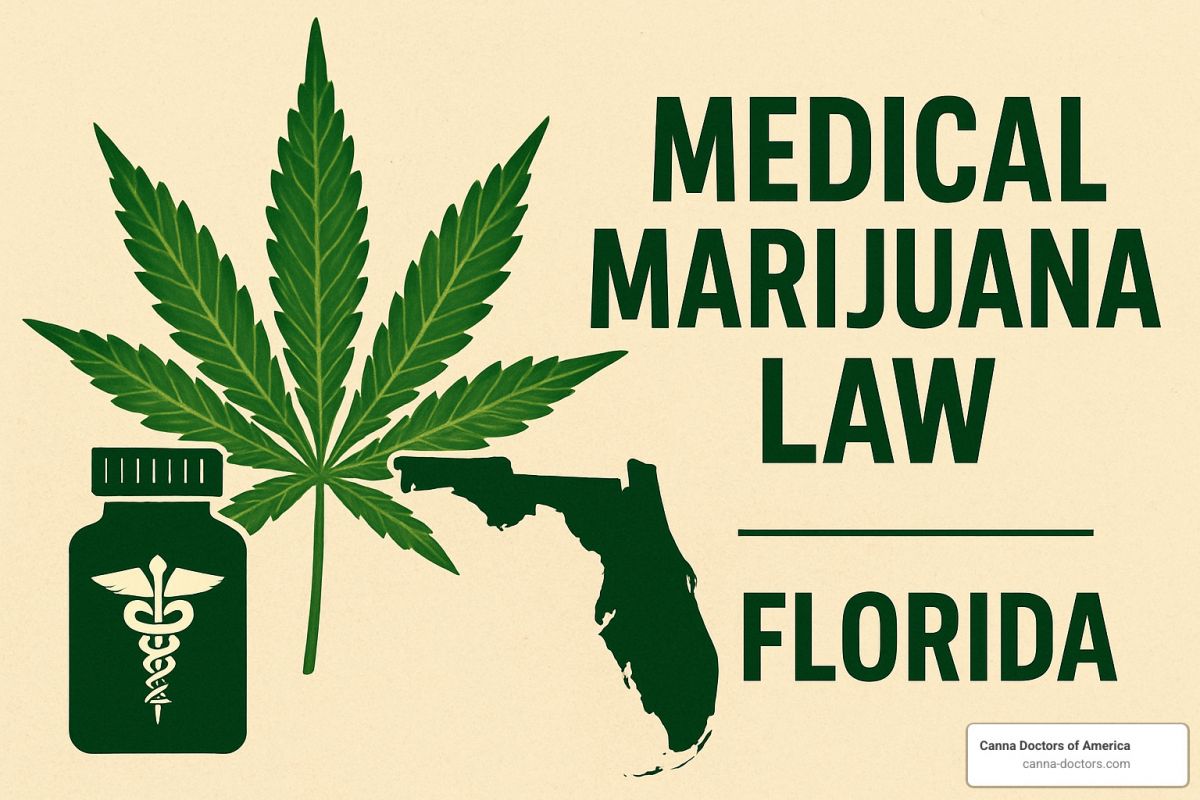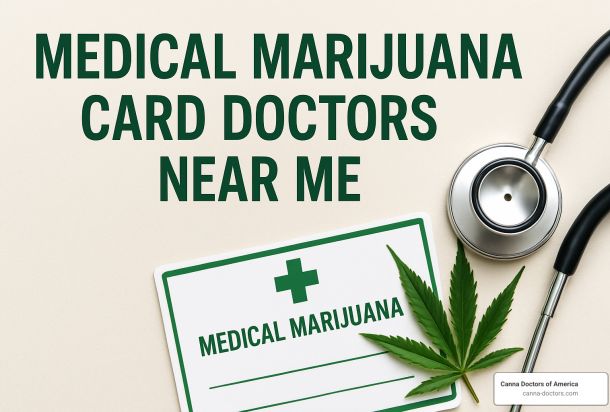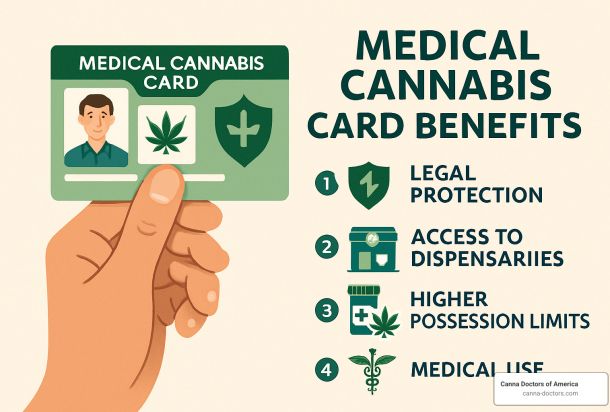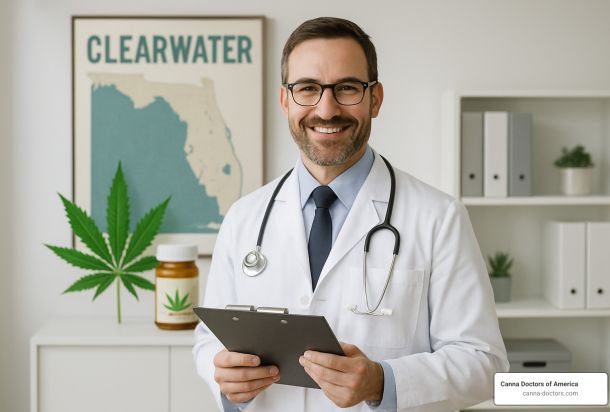Florida Medical Marijuana Laws Explained Clearly

Florida’s Medical Marijuana Framework: What You Need to Know
When it comes to medical marijuana law Florida, patients often feel overwhelmed by regulations and requirements. Let me break it down for you in simple terms.
Florida’s medical cannabis program offers genuine relief for thousands of Floridians living with chronic conditions. Since voters approved Amendment 2 in 2016, the state has built a comprehensive system that balances patient access with regulatory oversight.
Here’s what the current framework looks like:
| Key Aspect | Details |
|---|---|
| Legal Status | Legal for medical use only, signed into law in 2016 |
| Qualifying Conditions | Cancer, Epilepsy, Glaucoma, HIV/AIDS, PTSD, ALS, Crohn’s disease, Parkinson’s, MS, Chronic pain, Terminal illness |
| Supply Limits | 70-day supply for most forms; 35-day supply (max 2.5 oz) for smokable form |
| Home Cultivation | Not permitted under any circumstances |
| Patient Registry | Over 1.2 million registered patients as of 2025 |
| Employment Protection | Expanded protections for medical marijuana patients following 2023 court rulings |
Florida’s cannabis journey started modestly in 2014 with the Compassionate Use Act, which only allowed low-THC cannabis for a handful of conditions. The real change came in 2016 when Florida voters spoke loud and clear, approving Amendment 2 with over 71% of the vote. This landmark decision created the robust medical program we see today.
The Office of Medical Marijuana Use (OMMU) serves as the program’s watchdog. As part of the Florida Department of Health, they oversee everything from patient registrations to dispensary operations. While Florida has accepted medical cannabis, it’s worth remembering that marijuana remains federally illegal as a Schedule I controlled substance – creating an ongoing tension between state and federal law.
I’m Geoff Massey, Regional Director of Canna Doctors of America, and I’ve helped countless Floridians steer these waters. Many patients come to us confused about Florida medical marijuana law, but leave feeling confident about their path forward. My work involves educating patients about how CBD and THC might help their specific conditions, while guiding them through the certification process with compassion and clarity.
Looking for more specific information? We’ve got resources to help you understand how to renew your marijuana card, what happens during a medical cannabis consultation, or how to get your medical marijuana card in St. Petersburg.
Understanding Medical Marijuana Law Florida: Timeline & Current Status
The journey of medical marijuana law Florida represents one of the most significant healthcare shifts our state has seen in recent years. What began as a small, limited program has blossomed into a comprehensive system serving over a million Floridians seeking alternative treatment options.
Florida’s approach to cannabis reform has been measured and deliberate. Rather than rushing into full legalization, our state has taken careful steps to build a regulated system that balances patient access with public safety concerns. This thoughtful evolution has created a program that continues to grow while maintaining medical oversight.
From Compassionate Use to Amendment 2 – Key Dates
Florida’s path to medical cannabis access has unfolded through several key moments that shaped today’s program:
Back in 2014, the first door cracked open when Governor Rick Scott signed the Compassionate Medical Cannabis Act. This initial law was quite restrictive, allowing only low-THC cannabis (no more than 0.8% THC and at least 10% CBD) for a very limited group of patients – primarily those with cancer, epilepsy, or severe seizures.
The real change came in 2016, when Florida voters spoke loudly and clearly at the ballot box. Amendment 2 passed with an overwhelming 71.3% support, dramatically expanding both who could qualify and what products they could access, including full-strength medical marijuana.
The following year, 2017, saw Senate Bill 8A implement the framework for Amendment 2, establishing the regulatory structure that largely remains in place today.
A significant patient-friendly update came in 2019, when Governor Ron DeSantis signed SB 182, finally allowing smokable forms of medical marijuana, which had previously been prohibited despite being the preferred delivery method for many patients.
In 2022, the Office of Medical Marijuana Use (OMMU) issued emergency rules that established specific 70-day and 35-day supply limits for different consumption methods.
The 2023-2025 period has seen important developments in patient protections, particularly in employment law following the landmark Giambrone v. Hillsborough County case, which established precedent for workplace accommodations for medical marijuana patients.
The program’s growth speaks for itself – from roughly 27,000 patients under the initial limited program to over 1.2 million registered Floridians as of 2025. Research published in medical journals has documented how this policy evolution has impacted healthcare access across the state.
Current Legal Status Under medical marijuana law Florida
Today’s Florida medical marijuana law provides qualified patients with substantial legal protections, though important limitations remain.
Patients who maintain a valid Medical Marijuana Use Registry identification card can legally purchase, possess, and use medical cannabis within the state’s established limits. Perhaps most importantly, the law grants these patients immunity from Florida criminal and civil liability for medical use that complies with state regulations.
However, an unavoidable tension exists in our current system. Despite Florida’s comprehensive medical program, marijuana remains classified as a Schedule I controlled substance under federal law. This creates ongoing complications affecting banking services for dispensaries, research opportunities, and interstate commerce issues.
It’s also worth noting that adult-use (recreational) marijuana remains illegal throughout Florida. While several ballot initiatives have attempted to change this status, medical use remains the only lawful path to cannabis access in our state.
Under current regulations, only licensed Medical Marijuana Treatment Centers (MMTCs) may legally cultivate, process, and dispense medical marijuana products in Florida. This vertical integration requirement distinguishes Florida’s approach from some other medical states.
As Dr. John S. Luque observed in the Florida Public Health Review, “Florida’s choice to house medical marijuana oversight under the Department of Health rather than alcohol/tobacco regulators contrasts with other states and reflects the state’s medical-focused approach to cannabis.”
This medical framework continues to evolve, with administrative rules frequently updating to address emerging issues while maintaining the program’s core patient-focused mission.
Who Qualifies & How to Get Registered
Navigating the path to becoming a medical marijuana patient in Florida doesn’t have to be complicated. Let’s walk through who can qualify and how to join the program with clear, straightforward steps.
Qualifying Medical Conditions List
The sunshine state has established specific health conditions that can make you eligible under medical marijuana law Florida. Think of this list as your first checkpoint on the journey to relief.
Cancer patients often find significant comfort through medical cannabis, as do those battling epilepsy or living with glaucoma. HIV/AIDS patients have reported improved quality of life, while those with PTSD may experience reduced anxiety and better sleep.
Other qualifying conditions include ALS (Lou Gehrig’s disease), Crohn’s disease, multiple sclerosis, and Parkinson’s disease. Seizure disorders also qualify, as do terminal conditions diagnosed by a physician other than your certifying doctor.
Many Floridians qualify through chronic nonmalignant pain – that’s persistent pain caused by a qualifying condition that lasts longer than the typical course of that condition.
Here’s where Florida’s law shows some flexibility: physicians can certify patients with “medical conditions of the same kind or class” as those listed above. This opens doors for patients with similar symptoms or impacts, though your doctor will need to provide additional documentation.
Step-By-Step Patient Enrollment
Getting your medical marijuana card in Florida is a bit like following a recipe – follow each step carefully, and you’ll reach your goal.
First, you’ll need to meet with a state-registered physician who’s qualified to evaluate patients for medical marijuana. This initial appointment must be face-to-face – no Zoom calls for first-timers! Your doctor will review your medical history, perform a physical exam, and determine if you have a qualifying condition. They’ll also talk through the potential benefits and risks of cannabis treatment.
If approved (and many patients with legitimate conditions are), your doctor enters your information into Florida’s Medical Marijuana Use Registry. Think of this as getting your name on the guest list for a exclusive club.
Next comes your application for the official Medical Marijuana Use Registry ID card. You’ll need to show you’re a Florida resident, submit a passport-style photo, and pay the $75 application fee. You can apply online for faster processing or by mail if you prefer.
The approval process typically takes 7-10 business days for online applications. The good news? Once you receive your email approval, you can head straight to a dispensary – no need to wait for your physical card to arrive in the mail. More info about Process
Wondering how long until that card arrives in your mailbox? We’ve got you covered with more details on How Long to Get Card.
Once you’re ready to visit a dispensary, you might wonder what to bring. Check out our guide on What Do You Need to Bring to a Florida Dispensary? for all the details.
Caregivers: Duties & Limits
Not everyone can easily access or administer their own medical marijuana. That’s where caregivers come in – they’re the helping hands for patients who need assistance.
Under medical marijuana law Florida, caregivers must be at least 21 years old and complete a state-required certification course. They’ll need to pass a background check too, though there are exceptions for close relatives in certain situations.
Caregivers can only assist one qualified patient at a time in most cases. They’re not allowed to be paid for their services beyond covering their actual costs – this isn’t meant to be a job, but rather a supportive role.
What can caregivers do? They’re authorized to purchase and transport medical marijuana for their patient, possess the patient’s supply limits, and help with administration. However, the law is clear that caregivers cannot use the patient’s medical marijuana themselves – that would be crossing a line.
The caregiver certification course costs no more than $100 and needs to be renewed every two years. This ensures caregivers stay up-to-date on the latest regulations and best practices for helping their patients.
At Canna Doctors of America, we often see how valuable caregivers are to patients with limited mobility or serious conditions. These dedicated individuals make medical cannabis accessible to those who might otherwise go without this treatment option.
Possession Limits, Forms & Usage Rules
Understanding what you can legally possess and where you can use medical marijuana is crucial for compliance with Florida medical marijuana law. The state has established specific limits that vary by product type, and knowing these rules helps keep you on the right side of the law.
Daily & 70-Day Supply Caps Under medical marijuana law Florida
Florida’s approach to possession limits is quite detailed – more so than many other states. In August 2022, emergency rules clarified exactly how much medication patients can have by each method of use:
| Route of Administration | Daily Limit | 70-Day Supply Limit |
|---|---|---|
| Smokable Marijuana | 2.025 grams | 2.5 ounces (35-day supply) |
| Edibles | 60 mg THC | 4,200 mg THC |
| Vaporized Products | 350 mg THC | 24,500 mg THC |
| Oral (Tinctures, Capsules) | 200 mg THC | 14,000 mg THC |
| Topicals | 150 mg THC | 10,500 mg THC |
| Suppositories | 195 mg THC | 13,650 mg THC |
Your doctor can’t issue more than three 70-day supply recommendations or six 35-day recommendations for smokable flower at once. This means you’ll need to check in with your physician regularly to maintain your access.
For smokable marijuana, there’s a special rule: you can only get 2.5 ounces in a 35-day period, and you can never possess more than 4 ounces total. The other forms of medication follow the 70-day supply model.
At Canna Doctors of America, we often remind patients that while these limits might seem complicated, they’re designed to ensure appropriate medical use. Your doctor can adjust your recommended amounts based on your specific needs, though they can’t exceed these maximums without special approval from the Department of Health.
Where You Can (and Cannot) Consume
Florida medical marijuana law is pretty strict about where you can use your medication. The simple rule is: keep it private.
You can legally use medical marijuana in your own home or on private property where you have the owner’s permission. That’s basically it!
The list of prohibited places is much longer. You can’t use medical marijuana in any public place, on public transportation, or on school grounds (even if you’re a qualified patient). Most workplaces prohibit use unless they’ve explicitly stated otherwise. Using in a vehicle (even as a passenger), on a boat, or in a correctional institution is also prohibited.
Even if you’re using low-THC cannabis (with 0.8% THC or less), which has slightly more flexible rules, most medical marijuana products in Florida exceed this threshold and fall under the stricter prohibitions.
Breaking these location rules can lead to consequences ranging from a simple citation to criminal charges, depending on the circumstances and how understanding the officer might be. It’s simply not worth the risk – keep your medication use private and at home.
Traveling With Florida Medical Marijuana
When it comes to traveling with your medication, Florida medical marijuana law creates some important boundaries you’ll need to respect.
Within Florida, you can transport your medical marijuana as long as you follow some common-sense rules: carry your MMJ card, keep products in their original packaging, don’t exceed your legal possession limits, and store everything out of reach while driving (ideally in the trunk).
However, crossing state lines with your medication is where things get tricky. Even if you’re heading to another state with legal medical marijuana, taking cannabis across state lines remains a federal offense. Your Florida card provides no protection once you leave the state.
Air travel presents similar challenges. While TSA agents focus primarily on security rather than looking for drugs, if they find marijuana during screening, they may involve local law enforcement. Airports fall under federal jurisdiction, creating legal risk even with a valid Florida card.
International travel with medical marijuana is absolutely off-limits and can result in severe penalties, including imprisonment in some countries. The global variation in cannabis laws means what’s medicine in Florida might be considered a serious drug offense elsewhere.
As we often advise our patients at Canna Doctors of America, the safest approach when traveling outside Florida is to research your destination’s medical marijuana laws before you go. If possible, look into obtaining temporary authorization there rather than risking transport across borders. Planning ahead can save you significant legal headaches later.
Protections, Penalties & Reciprocity
Understanding your rights and responsibilities under Florida medical marijuana law is essential for navigating potential legal challenges and avoiding penalties.
Employment & Housing Considerations
If you’re a medical marijuana patient in Florida, you might be wondering about your rights at work and home. The landscape has evolved significantly since the program began.
When it comes to your job, Florida medical marijuana law has seen important developments. As of 2025, employers are increasingly required to provide reasonable accommodations for qualified patients’ off-duty medical marijuana use, following the precedent set by the Giambrone v. Hillsborough County case in 2023. This landmark ruling found that the Florida Civil Rights Act requires employers to consider medical marijuana similar to other prescribed medications.
While these protections have expanded, they’re not universal. Many employers can still maintain drug-free workplace policies, particularly those with federal contracts or in safety-sensitive industries. Your boss can also prohibit medical marijuana use on company property, even during breaks.
Housing presents similar challenges. Landlords maintain broad rights to prohibit smoking or vaping in rental properties, and they can even ban any marijuana possession or use, regardless of your medical status. If you live in federally subsidized housing, the situation is even more restrictive – HUD prohibits all marijuana use on their properties due to federal law.
Penalties for Violations of medical marijuana law Florida
Even with your medical card, there are still ways to run afoul of the law if you’re not careful.
Possessing more than your legal limits can quickly escalate from a misdemeanor to a felony depending on the amount. Consuming in public places might seem harmless, but it can result in a civil citation or even misdemeanor charges. And remember – Florida medical marijuana law offers zero protection against DUI charges if you drive while impaired.
Some violations carry particularly severe penalties. Fraudulently obtaining marijuana through misrepresentation is a third-degree felony. Selling or transferring your medicine to someone without a card can land you in serious legal trouble with felony charges. Even something as simple as forgetting your ID card when questioned by law enforcement can result in a $100 fine and potential misdemeanor charges.
At Canna Doctors of America, we’ve seen patients face unnecessary legal complications simply because they weren’t fully informed about these restrictions. We always emphasize that your card offers important protections – but only when you follow the rules.
Out-of-State Patients & Reciprocity
Planning to visit the Sunshine State with your out-of-state medical marijuana card? Unfortunately, Florida takes a strict approach to reciprocity – there isn’t any.
Unlike states like Oklahoma or Maine that honor out-of-state cards, Florida does not recognize medical marijuana authorizations from other states. This means visitors cannot legally purchase or possess cannabis in Florida based solely on their home state’s card.
There is a pathway for seasonal residents, however. If you live in Florida for at least 31 consecutive days per year (think snowbirds and part-time residents), you can qualify for the program with proper documentation. You’ll need proof of your temporary residence such as a lease or utility bill, a physician certification, and you’ll have to complete the application process with the required fees.
This approach creates challenges for tourists needing medical cannabis during their visits. The only legal option is qualifying as a seasonal resident, which isn’t practical for most vacation travelers. We regularly work with seasonal residents at Canna Doctors of America to help them maintain legal access to their medicine while enjoying their time in Florida.
The lack of reciprocity highlights the patchwork nature of state-by-state cannabis laws and underscores the importance of researching local regulations before traveling with or seeking medical marijuana across state lines.
Oversight of Physicians, Dispensaries & Product Safety
Florida medical marijuana law creates a robust system of checks and balances to keep patients safe and ensure everyone in the cannabis ecosystem plays by the rules. From doctor training to product testing, these safeguards help maintain the program’s integrity.
Physician Certification Standards
Before a doctor can recommend medical marijuana in Florida, they must jump through several hoops designed to ensure they’re properly trained and following the rules.
Florida physicians need to complete a specialized 2-hour course and examination through either the Florida Medical Association or Florida Osteopathic Medical Association. This isn’t just a one-time requirement—they must renew this training annually to stay current with the latest research and regulations.
When you visit a qualified physician for certification, they’ll conduct a thorough physical exam and review your medical history. They’re required to determine that medical marijuana’s potential benefits outweigh its risks for your specific condition. You’ll also need to provide informed written consent on a standardized form that acknowledges you understand both the benefits and risks.
Your doctor must see you in person at least once every 30 weeks (about 7 months) to maintain your certification. They’re limited to issuing no more than three 70-day supply certifications and no more than six 35-day certifications for smokable marijuana.
To prevent conflicts of interest, physicians cannot have financial ties to or employment relationships with any medical marijuana testing laboratory or treatment center. This separation helps ensure recommendations are based solely on medical need rather than financial incentives.
Medical Marijuana Treatment Centers (Dispensaries)
In Florida, dispensaries go by the official name Medical Marijuana Treatment Centers (MMTCs). What makes Florida’s program unique is its vertical integration requirement—each MMTC must handle everything from growing the plants to selling the final products.
The state initially limited licenses to just 10 companies, with additional licenses becoming available as the patient population grew. Today, over 100 dispensary locations operate throughout Florida, though rural patients often face fewer options than those in urban areas.
The financial barriers to entry are significant. Each MMTC must post a $5 million performance bond (though this drops to $2 million after serving 1,000+ patients) and prove they have the financial resources to maintain operations.
Security is taken extremely seriously at these facilities. Every MMTC implements 24-hour surveillance, alarm systems for unauthorized entry, and secure storage for all cannabis products. Employees undergo background checks, and when products are transported between facilities, they must follow strict protocols with detailed manifests tracking every gram.
One patient-friendly feature of Florida’s system is home delivery services. Most MMTCs will bring products directly to your doorstep, which is particularly helpful for patients with mobility challenges or those who live far from the nearest dispensary.
The state requires biennial inspections of these facilities and mandates diversity plans for ownership, management, and contracting to promote equal opportunity within the industry.
Product Testing, Labeling & Advertising Restrictions
When it comes to ensuring product safety, Florida medical marijuana law doesn’t mess around. Every product you purchase from a dispensary has been tested by an independent, certified laboratory.
These labs check for potency (how much THC and CBD is actually in the product), as well as harmful contaminants like pesticides, residual solvents from extraction processes, heavy metals, and microbial impurities. The potency must be within 15% of what’s listed on the label—if it’s not, that batch fails testing and must be remediated or destroyed.
Product packaging in Florida is intentionally boring and secure. Containers must be child-resistant, opaque (not see-through), and free of imagery that might appeal to children. Each package displays the universal marijuana symbol covering at least 10% of the front surface, along with batch numbers, harvest information, ingredients, cannabinoid content, and warning statements.
For edibles, the rules are even stricter. They can contain a maximum of 200mg of THC per package, with no more than 10mg per individual serving. They can’t resemble commercially available candy, use bright colors, or feature cartoons that might attract children’s attention.
The state also keeps tight control over advertising. Companies can’t make unsolicited pop-up ads, target anyone under 18, make false or misleading claims, or promote health benefits without substantial evidence to back them up. Even patient testimonials and endorsements face restrictions.
At Canna Doctors of America, we help our patients understand these safety measures and how they protect you. We’re also happy to explain the different product options available at Florida dispensaries and how dosing works for various administration methods. For more information about dosing and consumption methods, check out our guide to Florida Medical Marijuana Dosages and Methods.
These regulations might seem extensive, but they serve an important purpose: ensuring that patients receive consistent, accurately labeled, and safe products while protecting vulnerable populations from inappropriate marketing tactics.
Frequently Asked Questions about Florida Medical Marijuana
You’ve got questions, and we’ve got answers! Here are the most common things people ask us about Florida medical marijuana law when they visit our clinics:
How many registered patients are in Florida?
Florida’s medical marijuana program has grown tremendously since its expansion in 2016. As of 2025, there are over 1.2 million registered patients in the state’s program. That’s about 5.5% of Florida’s entire population, making our state one of the largest medical cannabis markets in the country.
This growth reflects both increasing acceptance of cannabis as medicine and the expanding awareness of its benefits for various conditions. Each month, we see new patients who’ve been considering medical marijuana but only recently felt comfortable taking this step toward alternative treatment.
Is home cultivation ever allowed?
I wish I had better news on this front, but the answer is a firm no. Florida medical marijuana law takes a strict stance against home growing, with no exceptions whatsoever. Unlike states like Michigan or Colorado that allow patients to grow a limited number of plants, Florida requires all medical cannabis to be purchased from licensed dispensaries (officially called Medical Marijuana Treatment Centers).
Even as a registered patient with a valid card, growing a single cannabis plant at home can result in felony charges. This is one of the most restrictive aspects of Florida’s program, and many patient advocates are pushing for change on this front in future legislation.
Can minors join the program?
Yes, children and teens under 18 can absolutely qualify for medical marijuana in Florida, though the process includes some additional safeguards:
The minor patient must have a qualifying medical condition certified by a physician. Additionally, a second physician must agree with this determination (this second opinion requirement is waived if the child has a terminal condition).
Parents or legal guardians play a crucial role in the process. They must provide written consent for the treatment and be designated as the child’s official caregiver. This means the parent controls all aspects of the medicine – purchasing it, determining dosage, and overseeing its use.
For our younger patients at Canna Doctors of America, we typically recommend products with lower THC and higher CBD content, and we generally suggest non-inhalation methods like tinctures or capsules. We take pediatric cases very seriously, spending extra time educating parents about proper dosing, storage safety, and the importance of keeping medication secure and away from other children in the household.
Many parents tell us that medical cannabis has been transformative for conditions like severe epilepsy, autism, or cancer treatment side effects when conventional medications weren’t providing adequate relief. Does Florida’s Medical Marijuana Program Include Minors?
Conclusion
Navigating Florida medical marijuana law doesn’t have to be overwhelming, even though there are plenty of details to keep track of. Throughout this guide, we’ve walked through Florida’s comprehensive framework that carefully balances patient access with necessary oversight.
Let me share some practical advice I’ve learned from helping hundreds of patients through this process:
First and foremost, always stay within the legal possession limits. The quickest way to lose your legal protections is exceeding these carefully defined boundaries. Keep your medication in its original packaging and store it safely away from children and unauthorized users.
Your medical marijuana card is your shield against prosecution, so don’t let your physician certification or registry ID card expire. Mark renewal dates on your calendar—many patients set reminders 45 days before expiration to avoid any gaps in coverage.
When it comes to employment and housing situations, be proactive in understanding your rights. While protections have expanded significantly through 2025, clear communication with employers can prevent unnecessary complications. Federal properties and workplaces still follow federal law, regardless of your state card.
Only purchase from licensed Medical Marijuana Treatment Centers. I’ve seen patients tempted by “better deals” from unauthorized sources, but this immediately removes your legal protections and could result in criminal charges.
At Canna Doctors of America, we guide patients throughout Tampa, St. Petersburg, and Clearwater through these regulations every day. Our physicians take pride in providing clear, straightforward evaluations and practical guidance on using medical marijuana both safely and legally.
If you’re considering medical marijuana treatment, I encourage you to learn more about our process for obtaining certification. We’ve streamlined everything to make accessing medical cannabis as straightforward as possible while ensuring you fully understand how to comply with Florida’s laws.
Florida medical marijuana law continues to evolve, with ongoing developments in employment protections, possession limits, and possibly even recreational use on the horizon. By staying informed about these developments through 2025 and beyond, you’ll be better positioned to make the most of your medical marijuana treatment while keeping firmly on the right side of the law.
Compliance isn’t just about avoiding penalties—it’s about ensuring you can continue to access the medicine you need without interruption. A little attention to detail goes a long way toward a stress-free experience with Florida’s medical marijuana program.











